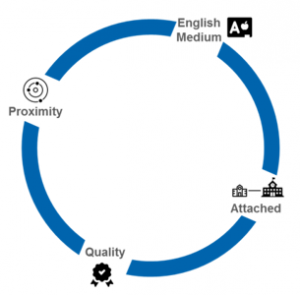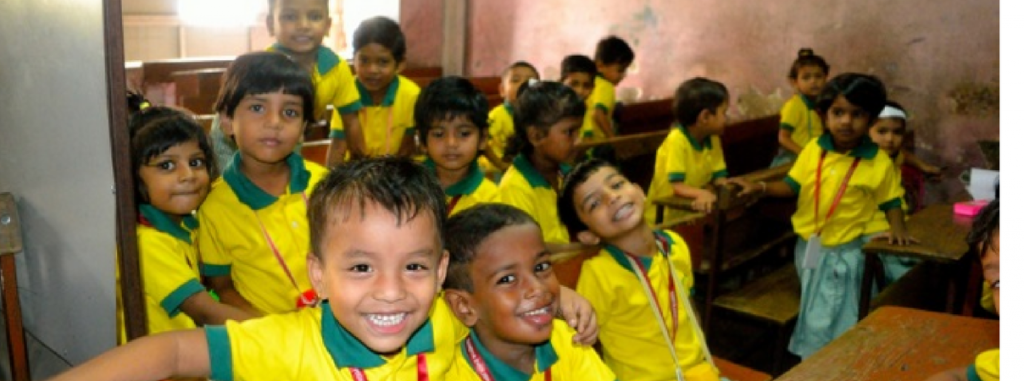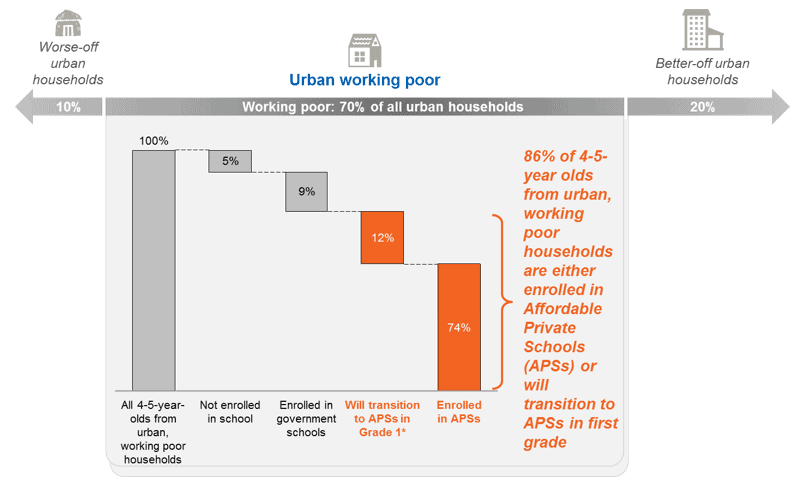Co-Author: Ahmed Irfan
4-min read
- FSG surveyed low-income parents in India to identify expectations they have of Affordable Private Schools (APSs)
- Using these expectations, FSG aims to inspire APSs to strategically transform their pedagogies.
- The full report can be downloaded here.
Current Education Landscape of India’s Urban Working Poor
FSG surveyed over 4,000 low-income parents across 8 cities in India to understand their beliefs and behaviors on how they choose schools and how they gauge academic progress. By knowing what drives these parents’ choices, we can identify how to shift these beliefs and behaviors in order to encourage Affordable Private Schools (APSs) to enact higher-quality schooling.
As the foundation for learning, preschool can set children on a path of educational success. In India, 86%of low-income parents (who make up 70 percent of the urban population) invest in private preschooling. Unfortunately, the current quality of preschooling in APSs is extremely poor, leading to poor learning outcomes through high school.
Shifting Parents’ Expectations Toward High-Quality Preschooling
Our research uncovers several opportunities to leverage existing beliefs and motivations amongst low-income parents—particularly the demand for English and mathematics skills—in order to scale high-quality preschooling sustainably.
Insight 1: Low-income parents care deeply about their child’s education
Despite the availability of free public options, low-income parents are investing about 6%of household income per child on core preschooling-related expenses in private schools, as they believe private schools can help improve their child’s academic prospects.
1/4 of parents are also investing in tuition classes to further support their child’s academic progress, spending an additional 2% of household income.
Insight 2: Parents have 4 primary criteria when choosing a preschool provider

Insight 3: Parents strongly prefer schools that brand themselves as “English-medium”
Of the parents who had chosen private schools, 78% opted for an “English-medium” school, and were paying a 28% premium on core preschool expenses.
This reflects their views about which skills are needed for success in grade school and to secure a white-collar office job—an aspiration for many working poor.
Insight 4: Parents want to know their child is learning, but there is a crucial gap between what parents expect their children to learn and the markers they are using to test learning
Currently, parents are gauging their child’s learning by using “wrong” markers or markers that check their child’s rote memorization (e.g., can my child recite numbers up to 20).
Instead, “right” markers of learning or markers should be promoted to test a child’s conceptual learning (e.g., can my child pick out 12 sticks from a stack of 20. Thus, schools will need to respond by shifting their practices to activity-based approaches that support conceptual learningLeveraging existing beliefs and motivations among low-income parents could spread high-quality preschooling throughout India
Given the competitive market in which APSs operate in, and their need to satisfy parental demands for conceptual learning, more APSs will shift their practices to activity-based approaches that support holistic early development of children.
For the full report, please download here.



















